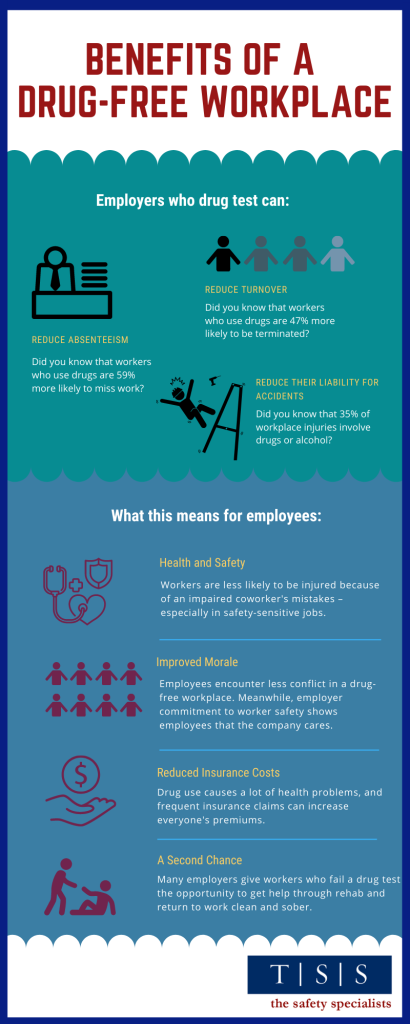Drug testing may not be required under Occupational Safety and Health Administration (OSHA) regulations, but the many, many businesses that must follow federal testing regulations, have come to realize the significant value that a drug-free workplace policy has added to their safety program.
When companies successfully implement and manage a drug-testing program, they can relatively quickly see the impact – increased productivity, fewer accidents, less absenteeism and lower costs as a result of having a safer work environment and a more consistent and reliable workforce.

How can you reap the benefits of workplace drug testing?
1. Develop a robust drug testing policy or review the one you have. The U.S. Department of Transportation has outlined extensive drug testing processes and protocols that can serve as a good guide for creating a drug testing policy, even if your business is not regulated by DOT. Visit the agency’s Office of Drug & Alcohol Policy & Compliance website for helpful resources.
A well-articulated and updated policy is critical to achieving your goal of keeping impaired workers out of the workplace. Many organizations have a policy, but no one has updated it in years (or even decades). Yet, so much is always changing in terms of the types of drugs that can be tested for, how testing is conducted and local and state laws pertaining to certain substances like marijuana. Your policy should be updated and reviewed by your company attorney, then reviewed and discussed with your employees.
2. Communication is key! For a drug-testing program to be effective, all employees must know the company testing policy, what is expected of them and the consequences for non-compliance. Every employee should sign an acknowledgment form, confirming that they have read the policy and understand it, and these forms should be kept in their employment files. This protects both the employer and the employee if there is ever an issue.
3. Remember, you have the right to drug screen. Some employees will argue that drug testing is invasive and infringes on their rights. But as an employer, you have the powerful argument on your side that drug screening protects the business AND the employee. No one wants their safety to be at risk or their co-workers to be injured due to impairment.
4. Know the law. States and municipalities have varying rules about how and when testing may occur. Check local regulations before you implement your policy.
5. Make sure that you are working with qualified and capable drug test collectors. The drug screen collection technician should be a highly trained individual who conducts all tests within required regulation, without judgment or adversity, producing a collection in a fair and just manner. Collectors are responsible for maintaining the integrity, accuracy and confidentiality of all results.
If the belief in your industry is one of “If we test, we can’t hire anyone,” you already have problems. Substance misuse in the workplace costs U.S. employers billions of dollars annually. Increased absenteeism, low productivity, near miss or time loss accidents can bring a business down quickly. And once the word gets out that Company A does not screen or enforce their policy, your business becomes a magnet for workers who may well be under the influence at work.
Studies show that for every ONE DOLLAR that is invested into a drug screening program, the company saves SEVEN DOLLARS. A drug-testing program should not be an overwhelming cost to an employer. And it should save you money in other areas. TSS specializes in helping employers get this right. If you need assistance, contact us for a no-obligation conversation about implementing a drug screening program.
(This article pertains to NON-Department of Transportation employers)

